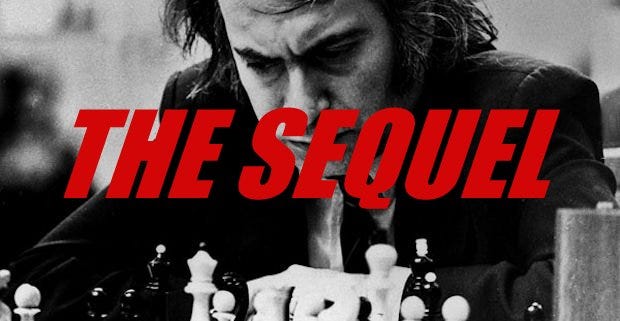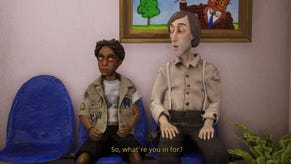Wot I Checked: Chess 2 - The Sequel
Still waiting for Ludo XII
Ah, Chess 2. A joke made real? Seems like it, only they're not joking. This is a straight up remix and rebalance intended to shuffle the game away from its standard opening/closing moves and to fix the "problems" of the venerable chequered board format. But how can that work? And more importantly: does it work?
Read on for my handful of chess anecdotes and some writing about Chess 2, too. Toooo.
It's easy to assume that most of you are familiar with Chess, the original boardgame version. It's a bit of a classic, dating back beyond Cluedo to the medieval era, and from there to 3rd century India as the game Chaturanga. In a sense, Chess is a Chaturanga clone, and I bet the developers of that never really got the credit they deserved. Anyway, you've definitely seen it, and you will understand its gravity, even if you don't understand how to play. Basically, Chess is sort of important, and was the only game (other than the ones involving actual submarines and aircraft carriers) to feature heavily in the international politics of the Cold War.
Chess 2 is a game by David Sirlin and Zachary Burns. Sirlin a game designer and prolific writer on game design. His deepest interest is in rebalancing multiplayer games, and he's done some interesting work on exposing how and why that process is so tricky. He's a clever chap, no doubt about that. The consequence of his cleverness is that this isn't some cheap novelty predicated on silliness, but a considered and intelligent remix of the great-grandmaster of games. It introduces new rules and new armies, and their moves and powers change the feel and pace of the game. You may snort with knee-jerk derision at such a brazen overhaul of the ancient game, but it kind of works. Equally you might snort at the potential boringness of the idea, but it kind of works.
The main change is a single rule: if you get your king safely over the mid line of the board, you win. This single change of course completely alters the dynamic, and creates utterly different strategies for play. And yes, it's a clever change. It immediately made the challenge of this new game interesting.

But there's a much wider change, and that's the new pieces and the six armies, any of which can be played against each other. Each army has a different set of abilities. The Classic army is the only army with a Queen, and plays as per the original rules. The Two Kings army has super kings which have an extra move. The Empowered army features bishops, knights, and rooks, and these work together to gain each others movement properties when adjacent. The Animals army features a set of quite different pieces with unusual moves, while the Nemesis army and Haunted armies have a couple more esoteric sets of abilities, including rather random teleportation things. Weird.
The armies certainly make things different, and I like it, but it'd take countless years play to properly evaluate the effectiveness and play of these pieces against each other.
But there's more. You can also play a limited set of beads to win "duels" between pieces, negating the possibility of something automatically taking another piece. This is a limited resource, however, and one that means you can gamble on critical moves. I'm not sure I like this, and it feels like a move too far. I can't deny that it brings even more life to the proceedings, however.
You can play the computer, which is rubbish at playing, or you can play in the ranked matchmaking. That took me a while to get a game on, which suggests the population of the game might be its main undoing.
So that's Chess 2.
And here's where I step back for some anecdotal perspective. Chess 1 has always been sort of theoretically important to me, although I've studiously avoided playing anyone who was particularly good because I am a terrible loser.
In an event that makes my life sound like it was invented by Ian Fleming, I was taught to play Chess by an American architect in Singapore, and I consequently came to associate the game with a sort of austere tropical intellectualism, and also iced tea. Being a boy at the time meant I wasn't ready to conduct much of a critical analysis of the game, but I do remember finding it odd that the game was actually pretty boring. Even as a kid, I was able to force the architect into a draw. Yep, here it was, the game of kings, and you have to assume kings like stalemate situations where nobody wins. Because that is chess. The developers of Chess 2 came to similar conclusions, as they explained an interview with Eurogamer.
"If I were to make a completely new competitive game," Sirlin explained to Chris Donlan, "then tell you that over 60 per cent of games played by experts ended in draws, and it takes like an hour to play, it would be rejected right away as a competitive game I think. At the very least, it would be a bad property that you'd want to fix. That's one issue with chess, though, and it seems to have gotten more extreme over time."
This, then, is the true aim of Chess 2. The new victory condition and armies aren't arbitrary or just wild invention, they're a calculated attempt to make the game play so differently that it alters the fossilising techniques - such as simply brute memorising possible plays - and changes the game from one that is computationally boring, to one that is less predictable and more dynamic. This goal, I would argue, has been achieved. The wider goal of making a game that matters, however, isn't really there. The game never looks interesting, and it lacks the range of features that are actually required to facilitate online play - such as p2p chat - and that cripples its forward momentum.
Indeed, I can't help feel that this sort of well-meaning, well-encapsulated redesign was actually one half the puzzle of making the game of Chess 2. I once wrote a back page joke feature on the notion of "Chess 2" for PC Gamer magazine, and while it was wholly stupid, I've ever since been haunted by the thought that a genuine satire of how games work, based on Chess - THE LONG AWAITED SEQUEL TO THE GAME BOBBY FISCHER CALLED "LIFE ITSELF" - complete with cover flashes "NEW ARMIES!" "FIGHT THE JUNGLE QUEEN!"
Chess 2: The Sequel is the clearest opportunity I have seen for a deep satire of games and game design, and that opportunity has been squandered here. It's even in the title, for goodness sake! THE SEQUEL. Look, I'm not saying everything should be done for a cheap laugh, but I think there's actually an opportunity for an expensive, complicated laugh here. It could have been a satire of marketing, rebranding, even design itself. It could have been a golden chance for an all encompassing punchline.
But it isn't.
Chess 2 is out now on Steam. You can also download Sirlin's rules for free to play it with any old chess set.









